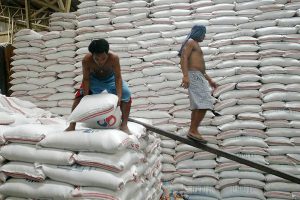THE SENATE on Tuesday approved on second reading a bill seeking to raise the annual allocation for the Rice Competitiveness Enhancement Fund (RCEF) to P30 billion from P10 billion until 2031.
Senate Bill No. 2779 allocates P9 billion from the RCEF to the Philippine Center for Postharvest Development and Mechanization and sets aside P6 billion to develop and grow “high-quality inbred rice seeds.”
In May, the House of Representatives approved its version of the measure, which sought to restore the National Food Authority’s power to import rice during national emergencies. House Bill No. 10381 increased RCEF to P15 billion from P10 billion.
In the Senate measure, the Department of Agriculture (DA) will be given the power to declare a food security emergency due to shortages or “extraordinary” increases in rice prices.
In emergencies, the DA may sell the NFA’s rice reserves in areas suffering shortages or “extraordinary” high prices of the grain, replenish the inventory with domestic rice, and import rice if no domestic grain is available.
The Secretary of Agriculture will be given the authority to designate the importing entity, while the NFA remains barred from importing rice.
Farmers tilling two hectares of land or less may also tap an P8-billion cash aid fund under the amended RCEF.
The fund also allocates P2 billion in credit assistance to rice farmers at minimal interest rates, with the program managed by the Land Bank of the Philippines and the Development Bank of the Philippines.
The measure also provides P1.4 billion from RCEF for the construction of solar-powered irrigation systems, and another P1.4 billion for composting facilities.
The Rice Tariffication Law of 2019 had deregulated rice imports, allowing private parties to import while paying a 35% tariff on grain brought in from Southeast Asia. The tariff generates the funds for RCEF. The tariff has since been reduced to 15%.
The law also removed the NFA’s authority to import, restricting it to buying domestic grain to maintain an emergency inventory of rice for use during calamities.
The Senate’s amendments to the rice law also include setting parameters for NFA inventory at “15 days during harvest season and 30 days during lean season,” to be maintained in order to ensure food security in the event of emergencies.
A Rice Industry Development Program Management Office under the DA would also be established to maintain a national database of grain warehouses, with the power to regularly inspect these warehouses. — John Victor D. Ordoñez
